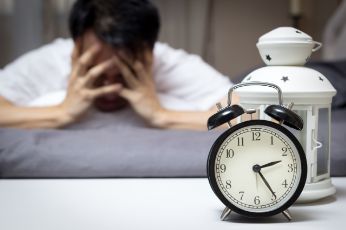
It’s a pretty safe bet to say that there’s never a good time to have tooth pain. But having a toothache at night is especially bad! You’re not only hours away from making it to an emergency dentist in the morning, but it can also feel nearly impossible to sleep. First, start by calling the dentist’s office and leaving a message for them to call you right away the next day. They typically leave room in their schedule for emergencies and will arrange for you to come in as soon as possible. From there, use the 4 tips below to relieve your pain and get some sleep.
1. Gently Brush, Floss and Swish With Warm Salt Water
You want to make sure there’s no debris lodged around the tooth that could be exacerbating your pain. Start by gently flossing under the gum line on either side of the tooth. Then angle your toothbrush bristles toward the gumline and gently brush the front and back surfaces. Finish by swishing with warm salt water for 30-60 seconds to soothe any irritated gum tissue.
2. Take an Over-the-Counter Pain Reliever
You can also take an over-the-counter pain reliever as directed until you can see your dentist. Ibuprofen is often a good choice but it can have a blood-thinning effect (along with other NSAIDs like aspirin and naproxen), so you’ll want to avoid it if you take a prescription blood thinner such as Warfarin. In that case, acetaminophen is a good alternative.
Topical numbing gel (benzocaine) can also be helpful but should never be used for children under age two.
3. Elevate Your Head
Lying flat makes it easier for blood to travel to your head, which can increase pain and throbbing from a toothache. Try elevating your head with a couple of pillows to stay more comfortable.
4. Apply a Cold Compress
Using an ice pack, cold compress or even a bag of frozen vegetables is also a great option, especially if you have any swelling. Wrap the pack in a thin towel and gently hold it to the outside of your face for about 15 minutes. This will constrict the blood vessels and reduce any pain and inflammation in the area. Repeat as necessary but no more than once per hour.
Lastly, keep in mind that it’s very important to have your tooth examined by an emergency dentist, even if the pain goes away. You may still have an infection that can become very dangerous if left untreated.
That said, the remedies listed here will help you manage any pain and stay comfortable until you can get professional care.
About the Author
Dr. James D. Geer has been a general and emergency dentist for over 40 years. In that time, he’s not only helped countless patients get relief from toothaches but also provided expert restorative dentistry to repair their smiles afterward. If you’re experiencing a toothache or have any questions, he can be contacted via his website or at (281) 357-4337.
